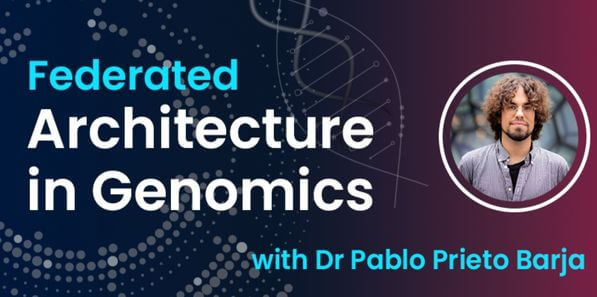Delivering Precision Medicine Programmes at Scale with Dr. Bacchelli
Divya Narasimhan, MSc
The Covid-19 pandemic highlighted the disparity between those who succumbed to severe illness while others remained relatively unaffected, underscoring the urgent need to shift the healthcare industry’s focus from a one-size-fits-all approach to more personalised healthcare.
Personalised medicine promises to transform healthcare with treatments tailored to a patient’s unique genetic profile (genomics) and by leveraging their genomic data to predict drug targets that will improve treatment outcomes (pharmacogenomics). Many ambitious initiatives have been successfully launched around the globe to gather genomic data at scale. The 100,000 Genomes Project has been a turning point for bringing evidence-based precision medicine to life. Over the past 15 years, many cancer treatments have benefited from deploying such population genomics initiatives. However, healthcare providers are still a long way away from unlocking the full power of genome data.
So the question arises: what is holding us back from deploying precision medicine at scale? Exploring this conundrum with us is Dr Chiara Bacchelli, Lifebit’s Human Genetics and Precision Medicine Lead. As former Associate Professor in Personalised Medicine and Genomics at University College London and Great Ormond Street Hospital, Chiara has vast experience in delivering translational genomic medicine programs. In this interview, Chiara sheds light on the challenges confronting healthcare systems with integrating precision medicine.
Why Do We Need Precision Medicine?
Before attempting to understand the challenges confronting the delivery of precision medicine at scale, we need to understand how it differs from conventional, evidence-based medicine.
Classical clinical trials stratify patients under a Single Disease
The drug discovery pipeline is a rigorous process that can take several years and billions of dollars to generate a safe and effective product. Before a drug reaches the market, it undergoes several phases of clinical trials where patients are grouped into a disease group or unified ‘umbrella’ and randomly assigned to either a treatment or placebo (control) arm. Thus, clinical trials effectively measure the outcome of a drug intervention against a control group, with minimal variability between the two arms so that the effect of the drug alone is visible.
However, there’s a conspicuous caveat that impacts many clinical trials. That confounding variable is the patient. Each patient’s individual genetic profile, lifestyle, metabolism, and sensitivity to drugs are factors that alter and shape their response to a treatment regimen.
Thus, correlating a disease to a particular gene, or array of genes, could revolutionise patient care by stratifying patients based on their genetic profile, rather than treating them under a single disease umbrella with the same drug.
In some conditions such as cancer, the genetics of the tumour alters the choice of treatment. For example, patients with breast cancer can be stratified based on their Human Epidermal Growth Factor 2 (HER2) status. Depending on whether they’re HER2-positive or HER2-negative, different drugs and treatments are prescribed.
Prevention better than Cure
Precision medicine can also direct preventative measures that patients can adopt to either modify their lifestyles or subvert an illness based on their genetic predisposition. For instance, carriers of the BRCA1 and BRCA2-associated mutations are at higher risk of developing breast cancer. Patients who have undergone genetic testing to reveal they have these cancer-associated mutations may choose to have a double mastectomy (surgical removal of breast tissue) to avoid the risk of developing cancer.
Pharmacogenomics: Patients are not uniformly responsive to a single Treatment
Drugs that successfully treat a condition in one population may fail in others due to variations between patients’ genomes. Life-changing treatments could be missed due to under-representation of genomic data from diverse ethnicities in large clinical studies.
“Even patients with the same disease are not the same because of their genetic background…Stratify [them] and really try to target the drugs to a specific group of patients rather than find one drug that fits them all,” explains Dr Bacchelli.
For example, a genome sequencing study that profiled asthmatic patients across multiple ethnicities in South America revealed 27 previously unreported variants that impacted treatment response to bronchodilator drugs. Such studies reinforce the need for understanding the mechanisms of a patient's response to a drug based on their genetic constitution, as well as the need for a more diverse representation in genomic data and clinical studies.
Provided there are significant quantities of data, researchers could even predict how groups of individuals with similar genetics respond to a certain treatment regimen. This requires large databases or biobanks of matched clinical and genomic data, collected and managed by data custodians. The data can then be interrogated by researchers or pharmaceutical companies to identify patterns in how genetics impact the prognosis of a disease as well as the response to a treatment.
Increasing the odds by increasing the numbers in Rare Disease Research
When it comes to rare diseases, conventional clinical trials often fall short of obtaining statistically significant outcomes and thus identifying appropriate treatments. According to studies, more than 95% of rare diseases continue to remain untreatable. Implementing a treatment regimen is further complicated by the protracted time taken to diagnose a rare disease.
However, as Chiara explains, precision medicine has a high value in diagnosing and treating rare diseases, through analysis of diverse patient data, integrating an individual’s medical history with their genomic, epigenomic, metabolic, and pharmacogenomic profile, to devise comprehensive treatment plans.
“Treating a rare disease is fraught with difficulties because patients are sparse and distributed all over the world, making it very difficult to significantly pin down the molecular mechanism or genetic cause underlying the disease. This means that to find a treatment for a rare disease, clinicians need full access to such patients and their combined clinico-genomic data.”
Large-scale genomic data is thus critical in delineating gene variants linked to a disease. Healthcare providers, research organisations and governments around the globe have driven highly valuable initiatives aimed at amassing clinico-genomic data from thousands of people to create biobanks such as Genomics England, All of US, GenomeAsia 100K, FinnGen, Hong Kong Genome Project (HKGP) and Genomics Thailand Initiative.
Bringing a Precision Medicine Programme up to Scale
Despite large volumes of clinico-genomic data ready to power countless precision medicine programmes, researchers seeking access to this data are met with significant challenges surrounding data security and accessibility.
One major hurdle is the vulnerability of patient data to security threats. Biobanks must take extreme caution sharing records that could be potentially decrypted. These threats around data privacy and security have created data silos, where information is kept highly secure yet can only be accessed by fewer groups or organisations. Connecting researchers to these siloed datasets are critical to moving the field forward, with various studies showing that research insights grow by 100X by increasing the pool of data 10X. Genome-wide association studies (GWAS) leverage these large volumes of unlocked genetic data to accurately map complex traits or diseases to novel gene variants that would otherwise remain undetected due to small sample size.
Innovative technologies that unlock patient data from silos would catalyse greater research collaboration and accelerate precision medicine. One such technology addressing this need is Lifebit CloudOS - a highly secure Trusted Research Environment (TRE) that allows researchers to access and analyse data in a virtual environment while all data remains securely at its source in full control of the data custodian. The platform’s federated architecture creates virtual links between researchers and secure data sources or TREs, allowing authorised researchers to integrate and analyse data across multiple cohorts.
Chiara noted that there are also challenges with integrating precision medicine practices into conventional clinical settings. A diverse educational programme that incorporates the study of human genomics and pharmacogenomics into University training is a necessary step to ensure that healthcare professionals can fully utilize the latest developments in genomics in clinical practice.
The Future of Precision Medicine
When asked what she sees in the future for precision medicine, Chiara said,
“Since we have the tools now to look into the genetics of people at the individual level, [we can] combine that with their clinical data to really inform which drugs each patient should take.
I would like to see this applied across the board, from the prescribing physician to the pharmaceutical companies [for a rare disease] instead of just the big blockbusters.”
If you have any questions about how Lifebit can help bring your precision medicine initiatives to life, get in touch with us here.



